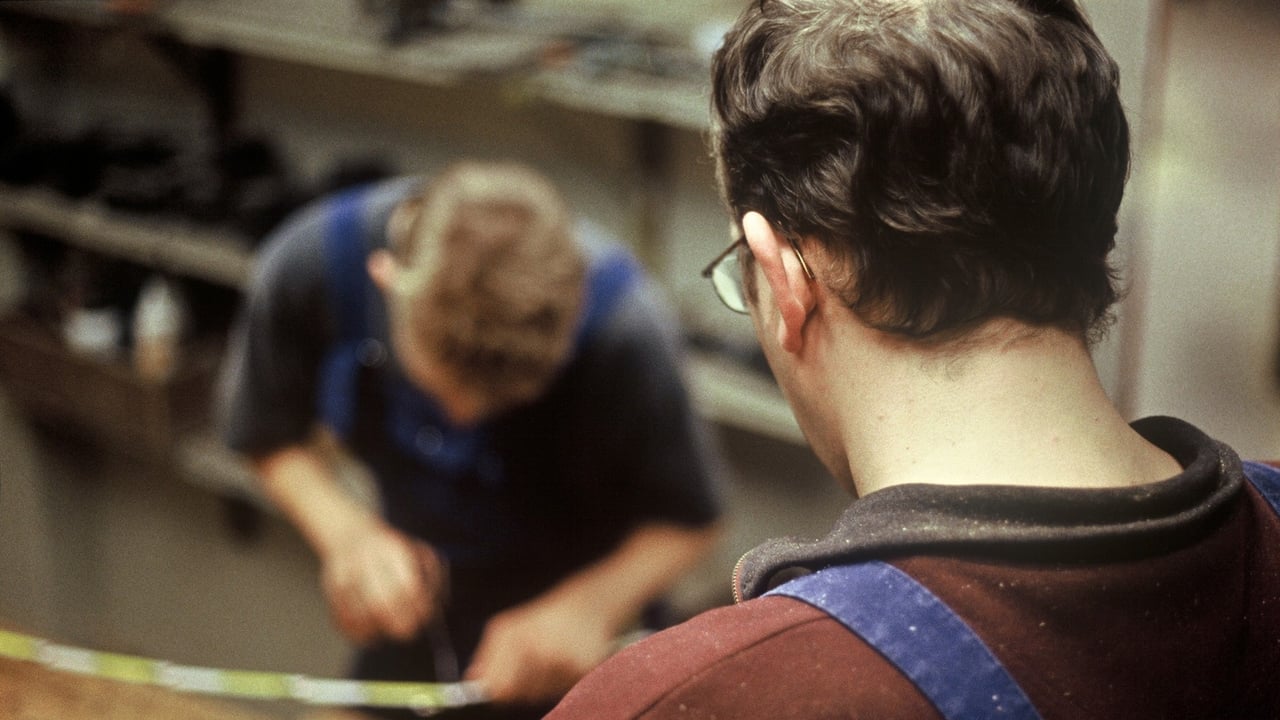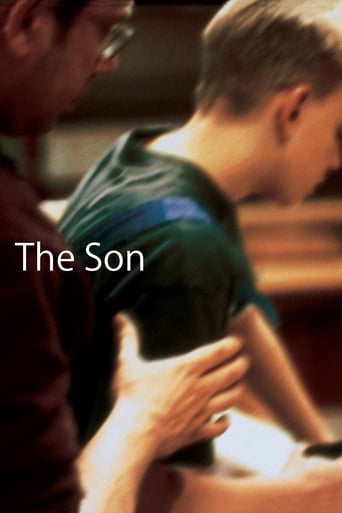

In one instance, the middle aged Olivier invades the home of one of his young apprentices, and berates him for not showing up to work. The reason for this is one he has seen before; the boy has taken a leave to take care of his sick mother. Olivier views this as a weakness. How dare he show compassion, how dare she drag him down, how dare he put his young career in jeopardy. He gets physical and demands that he return to work at once. And you can see that although it seems improper to be this invested in an apprentice's life, he cares for them in a way and wants them to be successful. Everywhere he looks, he sees his late son and what he could have been, and his harsh instructions drive them for the better.The camera-work from the Dardenne's is even more arresting than it was in Rosetta, where it hovered over the character's shoulder. Here, it seems surgically attached to Olivier, and it's movements are as erratic and restless as his steps. In the opening, he brusquely refuses to take on another worker, but as soon as the women leaves, he doggedly stalks her over to the welding department. He lurks behind corners, breathing heavily, and when he first encounters the boy in the workspace, we linger on his expression for an eternity, and we can hear the gears in his brain churning, wondering, and maybe thinking he might regret this. And then the camera swivels around and we see a boy laying there, unremarkable, and initially we are confused as to what is the root to this obsession. We have other scenes that subtly reveal the past demise. One of the first things hie ex-wife asks him is whether he still has back pain, a private detail that would not be openly revealed. We see this problem plague him throughout; he vigorously does sit-ups at regular intervals as a sort of treatment, but his form is ugly and betrays him as the lonely middle aged man, in average health and trying to better himself in vain. He stays at the centre because he feels useful watching over and mentoring his young apprentices, he admits. As she leaves, he again desperately chases her down like we saw in the opening, and as he huffs and puffs, he painfully wheezes a cry for help. Why now? Why this Wednesday? Why is she moving on, while he has nothing to look forward to?There is no music to speak of, like almost all Dardenne films (an exception is seen in The Kid with a Bike). The harsh whining of the wooden planks scraping the floor and the little grunts of exertion are all that we hear; as Oliver demonstrates the proper way to balance a plank on his shoulder, and the boy follows his lead, like a toddler mimicking a father. They use long takes, unblinking in their focus, to capture every single moment of Olivier's restless surveillance, as the camera is perched on his shoulder; he must know for sure whether this boy is worthy of his guidance and care, and observes endlessly and laboriously. He measures his worth as carefully as he does to the lengths of wood. He questions him pointedly, and gauges his moral character, and it becomes so urgent and vital that he misses his turn on the road. He asks if he is hungry, and pretends that is is treating the boy an apple turnover, before rescinding this offer and wondering how he will react. His name is Francis, and upon finding out his name, Olivier must've been flung into a excruciating world of conflict. On first viewing, it is not apparent at which point he discovers the truth. On second viewing, every barked order, every brusque word and every lingering judging stare becomes so much more meaningful, as a defensive means, as a pretense of 'tough love'. Marinne's performance pales in comparison, but it is not wholly uninspiring. He shields and conceals his past, and would rather not talk of the fatal incident. He does not understand the significance of the bravery and risk that Olivier is taking, and how much power he holds over him, how easily he could upset the cautious undertaking. He repeatedly asks in the car "Are we there yet?", something that a child would ask to a parent on a road trip, but he does not realise how painful this must sound to Olivier. This is Gourmet's film. As he painstakingly reveals the truth, we come to understand the entirety of his actions, and how justified they are. And so, even as he was physically violent to one of his boy's fathers earlier, we know that when he says he means Francis no harm, he means it.
... View MoreThis film, full of nuance and virtually no dialogue, is a good example of a European "art film." If you're looking for blockbuster action and a fast pace, keep walking. You won't find it here. If you're looking for a film that explores forgiveness, redemption and psychological tension, have a seat."The Son" can be painfully slow: dim setting, dark clothing, no dialogue. It leaves you wondering, "What's the point?" And, then, POW, you discover the raison d'être and everything falls into place. It is this very progression from WTF to illumination that makes this film a masterpiece. It's easy to see why "The Son" won multiple film festival awards in 2002, and it is most certainly worth your time.And, by the way, the acting by Olivier Gourmet and Morgan Marinne is sublime. I haven't seen any thing like it in quite awhile - and I watch a lot of films. Also, the cinematography is extraordinary with special attention to lighting. If you're a foreign film buff, grab this DVD.
... View MoreThere are only so many ways to cinematically tell a story, so when we see one that seems new, it charms. The overall value may be worthless I think this is but the manner of telling has charm.What we have is a camera tethered to a man, who I guess is in his mid-thirties. There isn't frame that doesn't include him somehow. The camera watches him obsessively: his hands, neck, back. No motion or stance is too minor to evade the lingering camera. No strange behavior or any behavior at all escapes.Meanwhile he is a furtive obsessive. He is a carpentry instructor. One should probably say trainer as he drills his teen students on minute movements for each task. He is obsessive in his own life, doing things with exaggerated precision. In another context, we may cry foul because of actorly overshowing. But the "showing" seems genuinely rooted in the character.We encounter him in a particularly furtive effort. We don't know what the episode involves until later, but it seems to involve a new boy.He peers. He sneaks, he spies and is remote. We eventually discover why a haunting event from five years prior.Now here's the trick. While we watch him with obsession, the entire film from beginning to end and beyond, is about his watching this boy. While he discovers and accepts this boy in his life, we do the same for him. Its classic folding: as we see him open, we subconsciously do.Unfortunately, we are left with thin rewards for opening our hearts. Because in the end, his character is defined to be valuable for the storytelling method, not the story itself. He doesn't matter.Ted's Evaluation -- 2 of 3: Has some interesting elements.
... View MoreThe Son is a movie about forgiveness, and how the very act of forgiving propels you forward as a human being. And to not only forgive the person who took away your son, but to become a guardian, a teacher to that person is an act of grace. Olivier exhibits this grace throughout the movie, but it is a grace that is not evident by just watching him on a day to day basis. You have have to follow him, listen to him, be with him constantly and understand his circumstances to realize this. I suppose, in a way, that many people possess this grace, but its hard to find it in them if you can't follow them around with a camera. Olivier, on the surface, would not seem like a very interesting person if you saw him on the street, or worked with him on a daily basis, and the boy seems like a dolt, but this movie makes them so interesting, so compassionate, not as characters, but as real people. It teaches you to look beneath the surface of things, of human beings, and if you look hard enough, you'll find beauty everywhere.
... View More